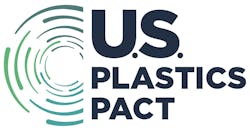U.S. Plastics Pact names problem materials
The U.S. Plastics Pact took a concrete step toward establishing a circular economy with the release of its Problematic and Unnecessary Materials List, which names 11 items that cannot be reused, recycled or composted at scale in the U.S.
Producing the list was one objective of the organization’s Roadmap 2025 initiative, which will be followed by efforts to eliminate those items by 2025. The list did not address medical plastics used in clinical, hospital or research settings.
The list includes:
• Cutlery, stirrers and straws (There are several caveats: When non-reusable, non-recyclable, or non-compostable per U.S. Plastics Pact definitions and provided as an ancillary item to the primary container. For instance, a packet of plastic cutlery provided with a prepared salad or a straw/stirrer provided with an on-the-go beverage would be defined as problematic, whereas cutlery, straws or stirrers sold as a product would not).
• Intentionally added perfluoroalkyl and polyfluoroalkyl substances.
• Non-detectable pigments such as carbon black. (Carbon black is invisible to common near-infrared sorting equipment).
• Opaque or pigmented PET bottles (any color other than transparent blue or green).
• Oxo-degradable additives, including oxo-biodegradable additives.
• PET glycol in rigid packaging.
• Problematic label constructions — This includes adhesives, inks and materials such as PVC and paper, and formats or features that render a package detrimental or non-recyclable per the Association of Plastic Recyclers Design Guide.
• PS — including expanded PS.
• PVC — including polyvinylidene chloride.
Tony Radoszewski, president and CEO of the Plastics Industry Association (PLASTICS), responded to news of the release of the list.
“The U.S. Plastics Pact is a group of well-intentioned companies and organizations, but they do not reflect the opinions of the broader plastics industry. And while they’re free to make decisions on what materials and products they do or don’t want to sell, or that they find ‘problematic,’ PLASTICS finds it problematic that the Pact hopes to tell others how to run their businesses by restricting their choices,” Radoszewski said in his emailed response.
“It’s a lot easier to make lists than it is to live with the unintended consequences of eliminating certain types of products. Product packaging is designed with specific functions or applications in mind, even if those aren’t immediately obvious to the end customer. For instance, plastic is often the most economical choice for both the producer and the consumer, as well as the most green option. Banning products can result in using alternatives that have much greater impact on the environment.”
Radoszewski concluded his statement by saying, “We believe in expanding choices by growing the amount of plastics that are recycled, and that will only happen through education, innovation, and smart advocacy.”
The U.S. Plastics Pact is made up of more than 100 businesses, non-profits and government organizations known as “activators.” The Pact is a voluntary group, and participation does not necessarily indicate an individual activator’s endorsement of the list.
“We thank our activators for their commitment to working together to deliver on the U.S. Pact’s targets,” said Emily Tipaldo, executive director. “The elimination of these problematic and unnecessary materials will enable advancements in circular package design, increase opportunities for recovery and enhance the quality of recycled content available for manufacturers.”
PMM will feature an interview with Tipaldo in the March issue of Plastics Recycling and online.
“Recycling will only work if we stop pumping contaminants and unrecyclable materials into the system,” said Anja Malawi Brandon, U.S. plastics policy analyst at the Ocean Conservancy, “And among other measures, we need recycling to work if we want to keep plastics out of our ocean. Our research shows that a majority of the trash found on beaches and waterways around the world every year during Ocean Conservancy’s International Coastal Cleanup is effectively unrecyclable. Phasing out these 11 materials will go a long way in cleaning up the recycling stream and our coastlines."
